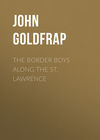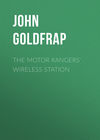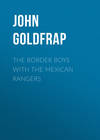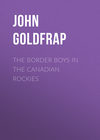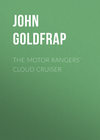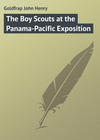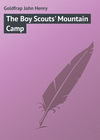Kitabı oku: «The Boy Scouts at the Canadian Border», sayfa 8
CHAPTER XV
ON DUTY BENT
About this time Rob ceased rubbing in the salve.
“There,” he told Donald, as he helped the other draw down his trouser leg once more, “I’ve done all I can for the present. I’ll take the salve along, and let you have another application later on, if you want me to; or it may be your good mother at home will have something just as fine.”
Tubby had been impressed with the grit of the boy who had shown such a commendable spirit. He understood what Donald meant when he said he was bound to go along, no matter if he had to hobble, or even crawl a part of the way. Tubby thought that if this was a fair sample of the valiant fellows whom “Our Lady of the Snows,” as Canada is often called, had sent across the sea, they would surely “do their bit” for the cause they believed was just.
“Oh, Rob, we forgot one thing!” suddenly exclaimed Tubby.
“What’s that?” demanded Andy.
“Why, my uncle, you know, boys, will be coming back, perhaps before we return, and he won’t know what to make of seeing our things here without a word of explanation.”
“I’ve thought of that,” said the scout leader promptly, nor was Tubby much surprised; it seemed as though Rob never forgot anything. “Sit down and write a few lines in a hurry, Tubby, while the rest of us finish what few preparations are still necessary. For one thing, I’m going to fill the lantern again, because the tank is pretty low and I’ve found a gallon of oil handy.”
“But what shall I tell him?” asked the other, as he dropped upon a seat near the rude table on which were paper and pencil.
“Just say what’s fetched us up here, and that you’re going to leave the paper he’s to sign. Then he can see that it gets back safe, in case anything should happen to keep us from returning here.”
Tubby winced when he heard those words, they seemed so suggestive of some unknown peril threatening them. He kept on asking questions.
“I’d better say something about where we’ve gone, and why, hadn’t I, Rob?”
“Yes, just as little as you can; and now get busy. We’ll be ready to leave here in less than thirty shakes of a lamb’s tail.”
So Tubby started in. He may never have taken the prize for rapidity in penmanship and composition at school, for he was slow in everything he undertook, save eating. Spurred on by necessity which knows no law, he wrote hurriedly, telling in as few words as he could the “gist” of what was required. If any of the teachers in Hampton High could have watched Tubby as he sat there, with his tongue-tip between his teeth and a look of grim determination on his ruddy countenance, and witnessed how his pencil glided rapidly across the paper, they would have certainly believed the world was coming to an end, or at least that wonders never ceased, for Tubby could no longer be called “as slow as molasses in winter” or possessed of the characteristics of the creeping snail.
“There, that’s done!” said the writer finally, with a sigh of relief. “I’ve made a bully good job of it, too, Rob – saying just enough without any superfluous language. I hope Uncle George doesn’t destroy this message. I think it’s a real gem, and as good as anything I ever did. I’d like to preserve it.”
“Well, we’re about ready,” said Rob quickly. “Andy’s got a snack of food to take along, so we may be prepared for emergencies.”
“Oh, I hope now you don’t dream that we’ll get lost and wander all around in a dense Canadian bush for days!” exclaimed the alarmed Tubby.
“Not at all, with two such clever guides along,” Rob told him. “You know preparedness is one of the cardinal virtues of every true scout. I never knew the time when some fellows would refuse to take a bite, especially after some hours of rough tramping.”
They also saw to it that plenty of food was placed where the dog could secure it, for it was utterly out of the question for them to think of letting the animal accompany them. He might, by some inadvertent act, betray them at a time when it would mean unnecessary risk and trouble.
Tubby had placed the valuable paper and his explanatory missive on the table, so arranging them that they would catch the eye of his uncle as soon as the sportsman entered the bunk-house. Wolf had been fastened with a piece of rope, for it was not necessary that he should have the freedom of the place. Tubby was too tender-hearted to neglect a single thing in connection with the dog’s comfort while they were absent. Accordingly, he had placed a bucket full of water within easy reach of the dog.
“Good-bye, old chap!” he told Wolf, and received a friendly bark in return. “We’ll see you later, perhaps in the morning. Make yourself at home, and, above all things, be sure not to gorge too much. It’s a bad thing to make a pig of yourself about eating, Wolf. I’ve known a human to come back for a fourth helping, when he could hardly breathe, and he was thin in the bargain, like you. So farewell, old Wolf, and take things easy while we’re gone.”
At another time Andy might have flared up because of this direct allusion to his particular failing, and declared that he “was not the only pebble on the beach” when it came to “stuffing,” but there was so much of a more thrilling nature to occupy his mind that he let it go by, just as water might run off a duck’s back.
They passed outside, and the door was fastened with the bar. Wolf barked several times, and there was a note of wonder in his dog language, as though he could not at all understand what it meant. Then Tubby heard plain sounds from within that told him his warning had fallen on deaf ears, for Wolf was already starting in to have a glorious feast, after which he would probably lie down contentedly and indulge in a sound sleep; nor would he mind being left alone as long as the food supply held out – he was only a dog, you see, with a dog’s nature.
“Good-bye, old shack!” said Tubby, who seemed to have a streak of sentiment in his make-up, considerably more so than either of his mates. “We’ve certainly enjoyed you as long as we were here, and hope to see you again soon. Ta-ta!”
“Oh, let up on all that talk, Tubby!” complained Andy. “I really believe you love to hear yourself speak. If there’s anything worth while to say, it isn’t so bad. Better save your wind, because you’ll need it unless all the signs fail.”
Tubby, knowing that these were really words of wisdom, managed to “bottle up” as he was directed. Indeed, once they had commenced to thread the mazes of the forest he found that he had all he could do to follow the lead of the lame boy who served as guide to the expedition. All sorts of obstacles lay in the way, and it seemed as though most of these took especial delight in getting under Tubby’s feet. He had to dodge snags, climb over logs, brush through bushes that plucked his campaign hat from his head and scratched his face, slide down into miniature gullies, and then painfully climb up the opposite side; and all these various “ups and downs” kept repeating themselves over and over again.
But Tubby was “dead game.” He had entreated to be allowed to accompany this expedition across the line, and no matter what happened, his chums would never hear a complaint from his lips, not if he died in the endeavor to “keep up with the procession.”
Shame alone would have kept Tubby from showing any sign of weakness. He knew Donald must be suffering agonies from that sorely injured leg of his, for Tubby watched him limp at times when he forgot himself and half drag that limb after him. Well, it would be disgusting, according to Tubby’s notion, for a well and hearty fellow of his build to let a game little Canadian chap, with a bruised leg in the bargain, leave him in the lurch.
So they moved on, Rob had lighted the refilled lantern, believing that while there was no danger of their being discovered it was wise to have it burning, for the illumination, while scant in its way, might prove a time-saver. This allowed them to see what obstacles lay in their path, for which Tubby was very thankful; it undoubtedly saved him many a stumble, and possibly not a few bruises.
Big Zeb followed behind Rob, who was second, and Andy came between the woods guide and Tubby. In this order they were strung out along the zigzag path which, thin as it was through less frequent use in these days since the loggers had gone, could evidently be easily discovered by the sharp vision of the young Canadian scout.
This grouping also allowed Rob to hold occasional communication with Donald or Zeb, as the inclination or the necessity arose. After they had been going for some time Rob thought it well to find out whether Zeb agreed with the course along which the engineer’s son was leading them.
“I don’t suppose, Zeb,” he said softly, “that you chance to know of any shorter way for crossing the International Boundary?”
“No, I don’t know,” admitted the big guide. “He’s goin’ as straight as the flight o’ an arrow for the line. I knows this here path. Many a time have I gone along it, with Mr. Hopkins, who wasn’t mindin’ much which side o’ the line he got his moose on, so long as nobody bothered him. An’ some o’ the border patrols could be fixed to wink at that sort o’ thing; because the moose, ye see, passed from one side to the other right along. Yes, we’re gettin’ tha, younker, as neat as ye please. Donald sure knows what he’s adoin’.”
This was comforting news for Rob. It also pleased the others. When there is much need for accuracy two heads are often better than one, especially when in full accord.
Tubby figuratively “shook hands with himself” when he heard this, for it served to allay his last lingering suspicion that Rob feared they might get lost in the wilderness.
Although the fact has not been thus far mentioned, it can be taken for granted that the party left none of their firearms behind them at the logging camp when they started forth upon this dangerous mission. They did not know positively that any occasion would arise when the possession of these weapons would save them a world of trouble. Since they were about to compete with desperate plotters, who would naturally be armed, every one believed it was good policy to be ready to defend themselves in an emergency. As Rob said, “when you’re in Rome you’ve got to do as the Romans do.”
“How far from the logging camp would you say the border lies, Donald?” asked Rob, after more time had passed.
“Not more than two full miles alang this path,” came the answer.
“Right, to the dot!” commented Zeb.
“But surely we’ve come nearly that far by now,” Tubby up and said from the rear, as he ducked under some bushes that developed a fondness for scratching his face.
“We are nearly there,” asserted the guide, and then Andy hastily exclaimed:
“Listen, boys! that sounds like the rumble of a train right now in the near distance!”
“Oh! horrors!” gasped Tubby. “Can it be that we’re too late, after all?”
CHAPTER XVI
THE STONE CAIRN ON THE BORDER
“Naw, naw, ye’re baith wrang!” hastily exclaimed Donald, as soon as he could “get a word in edgewise.”
“But that certainly was a train we heard,” affirmed Andy stoutly, adding: “There goes a whistle! Don’t you hear it, Donald?”
“Oh, ay, but ye ken it was not my fayther’s hand at the throttle of the engine. That train is the regular passenger goin’ west. It is much too airly for the freight carrying munitions and stores, and bound east.”
“Well, I’m glad to hear you say so,” Andy was quick to admit.
“I can breathe easy again,” muttered Tubby, who had received quite a severe shock.
The sound of the train grew louder. They could even tell when it struck out on the trestle that served as an approach for the long and costly bridge. Naturally it thrilled them to remember that the unworthy plot of those who would strike a cowardly blow at the enemy of their native country by abusing the neutrality of the land that gave them friendly shelter – and protected them in the bargain – that this plan was laid to destroy that splendid piece of mechanical engineering, and, perhaps, engulf many human beings in the wreckage.
“Everything seems to be right – so far,” observed Andy, as they once again started to hurry along the dimly seen trail.
“We ought to be in time,” Donald told them over his shoulder, “accordin’ to what I heard them say. It’s hopin’ and prayin’ I am that I can hold out to the end. If the worst does come, why here’s a braw chap who could tak ye to the bridge. A’ ye hae to do is to tell them that Donald, the engineer’s lad, sent ye with the warnin’. They’ll know what to do the nicht. But I’ll manage somehow to get there, by hook or by crook.”
“You certainly will, if being game counts for anything, Donald, old fellow,” Andy assured him. “I never ran across a scout with more grit than you’re showing right now. Why, nearly any boy, with such a badly bruised leg, would be glad to let some one else do the running for him, satisfied to get the glory himself.”
“But do ye not understand, I could nae do anything less, because it is my ain fayther whose life is in danger?” the other said, apparently thinking that he was doing nothing so very wonderful – nothing more than any boy ought to do for the parent he loved.
The train was going away from them now, and by degrees they heard the sound of its passage less distinctly, until presently the rumble became very faint indeed, and then died away completely, though the falling of the night wind may have had considerable to do with this.
Rob, being a scout who always paid attention to even the smallest details, when on duty or off, for it had become second-nature with him, noticed that they were just about exactly opposite the place where, from the deep rumble, it seemed the western trestle and approach must lie. This he also knew was the end of the bridge they were heading for, since to reach the other terminus it would first of all be necessary to cross the river, which they were not prepared to do.
Besides, it was absolutely certain that the conspirators would also approach the object they planned to destroy from this side; and consequently Rob meant to extinguish the lantern, once he learned they were across the line.
“I can see something queer, like a pile of stones, ahead there,” announced Andy, who had particularly keen eyesight, and chanced to be looking forward at the time, instead of minding his steps.
“It is the cairn that marks the boundary,” said the Canadian boy simply.
A minute later and they had approached so close that all of them could easily see the object, which turned out to be a heaped-up pile of rocks, and on top was a broad stone slab, with some markings on it. Looking closer at the “monument” the boys read the words: “Boundary Line,” and underneath this “United States.” On the other side they discovered the word “Canada” below the same descriptive text.
“Well,” said Tubby, as they paused for a minute before crossing over, “just to think that I can sit here on this rock-pile, with one foot over in a foreign country and the other in our own home land. It seems queer!”
“Huh!” grunted Andy, always ready for a sly fling at good-natured Tubby, “take care then that you don’t have to sit on a stone-pile day after day, and wearing a striped suit. Please don’t get the habit, Tubby.”
“I won’t, I promise you,” retorted the other, “for it might be catching, like the measles, and you’d be a fit subject for contagion, Andy.”
“Start on, Donald,” said Rob, as he deliberately blew out the lantern, which he proceeded to carefully deposit at the base of the little pyramid of rocks, where they could get it again when on their way back to camp.
Evidently Rob did not believe there would be any further necessity for carrying a lantern. Besides, it was more or less of an encumbrance, since he had his rifle to handle in the bargain.
Tubby did not wholly like this. It would probably mean more frequent stumbles for him, and also knocks and scratches; but he did not remonstrate, knowing well that Rob was the best judge of what was right and proper.
So they all crossed the border, and found themselves treading the soil of Canada, for the first time in the lives of the three Boy Scouts of Hampton Troop.
“Why, it doesn’t seem one whit different,” said Tubby, in evident surprise, “and only for that sign on the slab of rock I’d never dream that I’d stepped over from Uncle Sam’s world, and was treading foreign soil.”
Andy was heard to snort as though highly amused, but he resisted the temptation to take a fling at the “unsophisticated farmer,” as he sometimes called simple-minded Tubby. As though there would be any perceptible difference in the soil and trees and rocks, because an imaginary line divided the continent between two entirely different nations!
Tubby sometimes knew better than he made out, and perhaps Andy was wise not to pursue the subject any further; he had been “stung” before, when attempting to take advantage of a “break” on the part of amiable Tubby.
“After this,” Rob was telling them, “be careful not to talk so loud. We don’t know which trail those men may take in passing across the border; but if they heard us speaking they would become suspicious at once. You must know that the very desperate character of their work would make them think everybody’s hand was raised against them; and the chances are they’d feel inclined to pounce on us, and at least make us prisoners.”
“Oh, that must never be!” said Donald, with deep feeling. “If they kept us fra warnin’ the bridge guards, ye ken, the whole thing wud be in the soup.”
After that they all fell silent, and the forward progress was carried out as so many ghostly specters in a country churchyard might stalk about at the hour of twelve, if, indeed, such visitors from the other world ever do visit this one.
For one thing the path actually seemed to be growing easier now, Tubby thought. At least he did not meet with so many obstacles to his progress, and could thank his lucky stars on this account. He really believed every square inch of his stout limbs below his knees must by now show signs of having come in rough contact with stumps, logs, rocks and all other manner of things. Indeed, Tubby had already made up his mind to apply in person to Rob for a portion of that healing salve, when a fitting opportunity arrived and their mission had been carried through successfully.
All of them listened anxiously as they went along. If a bird or a squirrel moved amidst the pine needles or the branches of a neighboring tree the sound, faint though it might be, gave them a corresponding thrill, because their nerves were all on edge, so to speak. Had a deer, lying in a thicket, suddenly bounded away with a crash of the undergrowth, Tubby feared he would faint, it was apt to give him such a terrible shock.
But there was no such alarm, and they were making steady progress all the while. Rob, as a rule, mapped out his plan of campaign beforehand, and he would have done so in this particular case also, only he considered that the honor of giving the warning should belong to Donald. The devoted Canadian boy had made a gallant attempt to carry the news of his terrible discovery to those in charge of the bridge’s safety; he had suffered all manner of pain and hardship in the effort, and it seemed only fair that he should reap most of the reward.
Besides, Donald knew the lay of the land in the vicinity of the bridge. Without his assistance as pilot to the expedition they might have strayed from the path and lost so much valuable time that even though they eventually arrived it would be only in time to hear the stunning report that would tell them the bridge was destroyed, and that the trainload of munitions had gone down into the gulf, a twisted mass of wreckage.
Tubby had conceived a new and somewhat alarming thought, and he wished that Rob had not placed that embargo on speech, for he wanted to ask a question very much. As it was, he had to take it out in looking anxiously upward every time they happened to be in an open bit of ground, where one could glimpse the clear heavens overhead, by straining the muscles of his neck terribly.
The fact of the matter was, Tubby had remembered about the aeroplane which all of them had so earnestly watched on that other day, when it sped across the line, descending low enough for the pilot to snap off a series of pictures of the ground below, together with the long railway bridge, and then once more scuttled away, heading for the American side of the border. He wondered whether those who meant to undertake the destruction of the bridge would come again in an aerial craft, and try to drop bombs upon the bridge at the moment the freight from the west was approaching the trestle.
Now, this was not so ridiculous as it might appear to some readers who may not know that Tubby, together with Rob and Merritt Crawford, had been abroad on the battlefields of Belgium and Northern France, where it was even then, in the early stages of the war, a common occurrence for aviators to soar over supply depots, railway stations, and various other central points, to try and blow them up by bombs they let fall from a great height. Why, Tubby could remember having looked upon a church used as an observation tower that had been successfully bombed in that way by a daring Teuton aviator.
He took a little more comfort, however, when presently he remembered that Donald had heard the plotters going over the details of their plans, and that according to all that was then said, they very evidently meant to use dynamite, planted under the trestle, and fired by means of a long copper insulated wire and a battery.
Plodding on, the little party began to ascend what seemed to be a gradual rise of ground. This would indicate that they were drawing near the railway line, for it was on a high bank at this place, a necessity caused by the fact of having to cross the river close by.
Tubby wondered what the next half-hour was fated to bring forth. He hoped they were going to meet with the success their efforts deserved, and that the miserable scheme might be nipped in the bud. Tired as the stout youth certainly must be, he was yet buoyed up by the excitement that had him in its clutches; and though the threatened bridge had been twice as far distant Tubby stood ready to keep going until he dropped from sheer exhaustion.
But the time was coming when the dull monotony of that advance was fated to be abruptly broken, and in a way calculated to give them a fresh thrill.

